NCOAE Blog
When to Call — or Not Call — for Help During a Wilderness Emergency
Wilderness MedicineIn wilderness or the backcountry, bad things can happen to even the most experienced of adventurers. Truth is, most illnesses and injuries on the trail can be managed by the adventurer, or with the assistance of someone possessing some training in wilderness medicine.
Of course, some injuries and illnesses do pose a threat to life or limb, and in other cases, the person — who for our purposes we’ll call our “patient” — may not even survive without professional medical intervention. It’s those situations in the grey area that leave many outdoor adventurers wondering, Do we call for help or not? You maybe conflicted for several reasons: pride or overconfidence, embarrassment or reluctance to admit weakness, misjudging the severity of the situation, concerns over medical costs, or perhaps you lack an effective means to contact emergency services.
As the ancient adage suggests: “He who hesitates is lost,” and the objective of this post is to equip you with the knowledge and insight needed to arrive at the right decision faster. Here, you will learn when to call for help, the type of help to call for, and the various means of communication you can use to call for help.
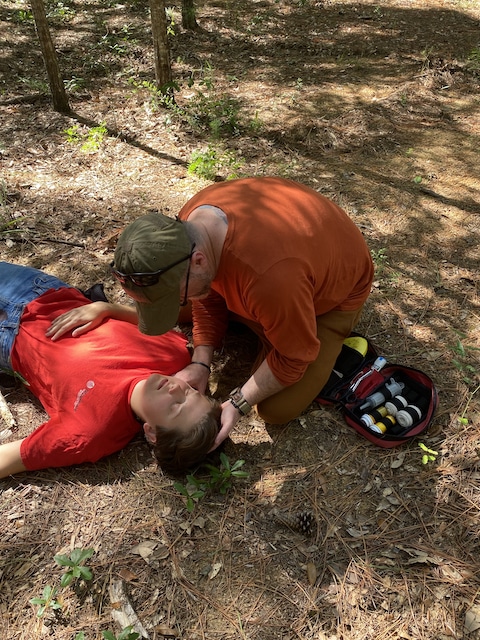
Important! Before embarking on any wilderness or backcountry adventure, leave your itinerary with a trusted individual, along with instructions to contact emergency personnel in the event that you fail to return or call on the scheduled date of your return. If you need a visual on how important this is, watch the 2010 film 127 Hours, which vividly illustrates the torment suffered by Aron Ralston, the rock climber who was forced to amputate part of his own right arm after it was pinned between rocks in an isolated canyon in Utah.
Deciding When to Call for Help In The Wilderness
When you or someone in your group suffers a serious illness or injury, toss your emotions aside and focus on the following factors in deciding whether or not to call for help: (more…)
The Quintessential Backcountry Expedition Road Trip Playlist
NCOAE RecommendsYou’ve probably passed us on the highway. We’re the weirdos with heads bobbing, playing air guitar and dashboard keyboard, shouting lyrics at the windshield, grinning from ear to ear on our way to the places that make us happy — the backcountry places where people go to play, challenge themselves, and connect with wilderness .
Once while sitting at a dead stop in a traffic jam, a woman hand-crank motioned me to roll down my window. She leaned out her window asked what I was listening to that made me ignore our current, static lack of movement.
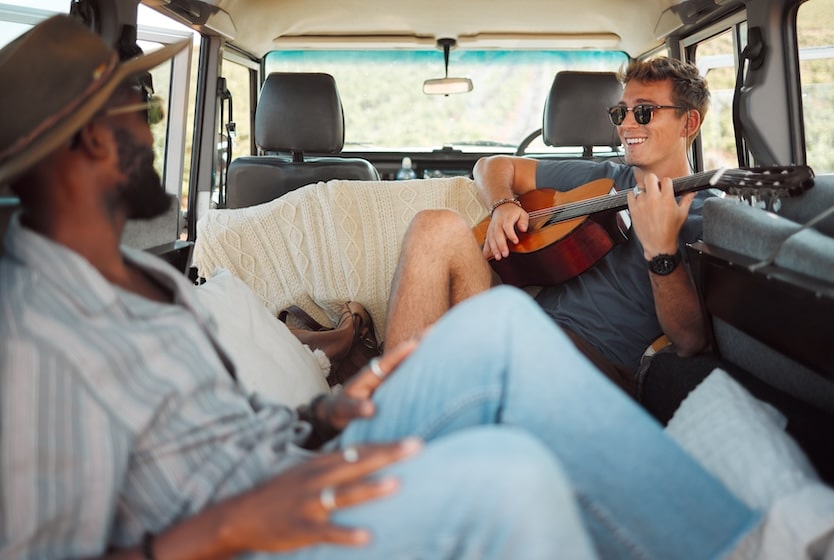
Jack Drag! That was my shouted response over the Indie Pop music blaring from my speakers.
Music moves us, literally and figuratively; it becomes the soundtrack of our lives that most of us only realize when we look back decades later.
Working in the outdoor education sector of the outdoor industry means traveling. Sometimes you find yourself on a desert highway, traveling alone to meet your group, gas pedal depressed deep into the car’s carpet, speakers distorting because they can’t handle the volume. You stare out the window into the beautiful brown and green landscape, listening to your favorite band as the lead singer’s voice cracks through the air like a peal of thunder. And then you smile, knowing that at the end of the road you’ll be taking people into (more…)
EMT Health and Fitness: How to Stay Physically Strong and Mentally Sharp
Emergency MedicineIt’s been my experience that emergency medical personnel — including Emergency Medical Technicians (EMTs) — tend to be much better at caring for others than for themselves. That’s generally the result of long shifts, life-or-death situations, and consistently helping people who are suffering the worst day of their lives. It’s going to take a toll.
To compound the problem, those who work in emergency medicine often neglect their own health and fitness. They forgo exercise, reach for junk food because it’s often handier. Or they begin to seek out various substances to get through the day. These might include energy drinks during their shift so they can remain alert. Or maybe a drink or three when they’re off the clock to calm their nerves and help them sleep.
Eventually, this unhealthy lifestyle catches up to them, negatively impacting their mood, energy, intimacy, and more.
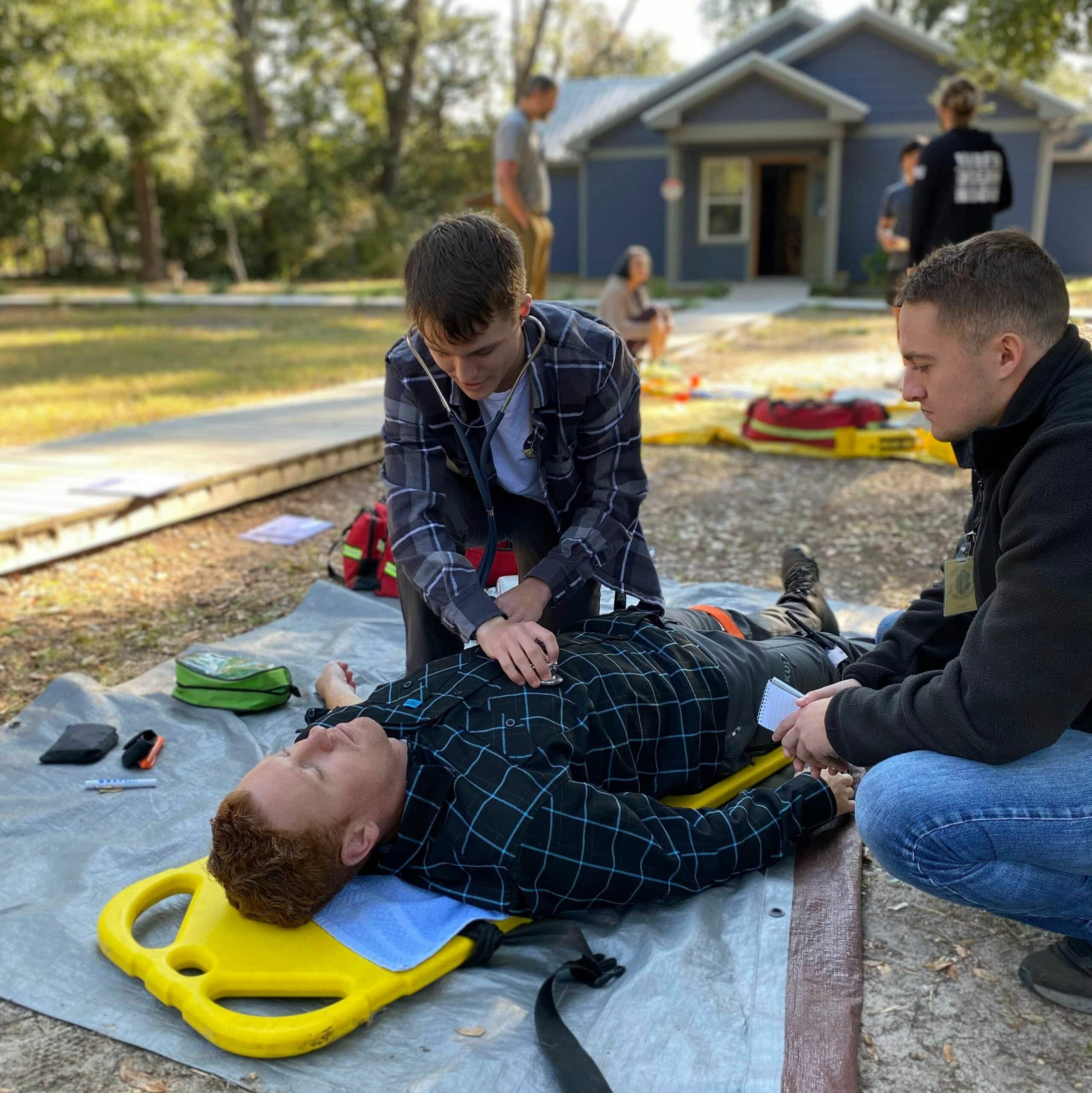
The multi-billion dollar a year health and fitness industry offers little in the way of relief for those in our field. And often overlooked is the overworked and stressed-out Emergency Medical Systems (EMS) shift worker.
If you’re a member of that demographic or you’re considering an EMT training and certification program like our Standard EMT, Hybrid EMT, or Wilderness EMT, don’t wait around in the hopes of that industry or even your own EMS unit will be reaching out to you. Make this your wake-up call. Now is the time to start focusing on your own health and fitness.
Remember the lesson you’re taught when you board an airplane — put your oxygen mask on first before helping anyone seated next to you with theirs. In the same way, you need to focus on your own health first in order to be healthy and fit enough to assist others when they’re experiencing a medical emergency. And continue that health regimen so you are healthy enough to make a lasting career in emergency medicine.
In this post, I provide practical advice on how to restore and maintain your own physical and mental health and fitness over the long haul.
Manage Stress
Stress kills. We are all well aware of its negative impact on health, but what we need to realize is that a great deal of our stress is self-inflicted. After all, we’re the only ones who can (more…)
The Value of Outdoor Education to Your Students and School’s Curriculum
Outdoor EducationFor as long as we can remember, private and independent schools have recognized the transformative power of experiential learning, and that’s particularly true when it involves outdoor and adventure-based activities. While all educators are trained and encouraged to seek innovative ways to engage students in their own education, private and independent schools have traditionally been more likely to partner with an organization like ours to create a custom outdoor program that reinforces their curriculum and culture.
Here at The National Center for Outdoor Adventure and Education (NCOAE), we assist all types of schools — including private and independent ones — to seamlessly incorporate outdoor and adventure-based experiential education into their curricula.
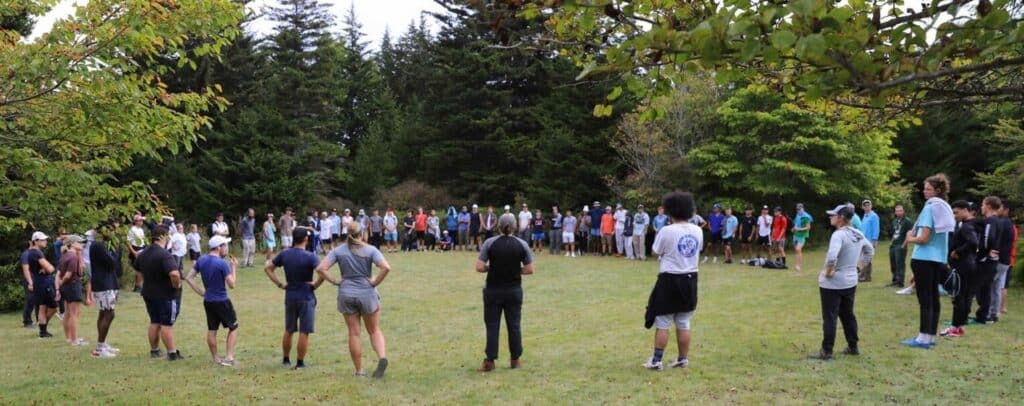
By exploring the benefits, practical considerations, and implementation strategies, we work closely with these schools to enhance their educational offerings. And when we succeed, we find we have awakened and nurtured a sense of adventure in their students. In addition, we have supported the development of well-rounded youth who are better equipped for success in academics, peer interactions, and the communities in which they live.
Benefits for Students
Participation in our highly customized and curriculum-based outdoor education programs contributes to higher student retention rates, higher grade averages, and positive changes in a student’s “Five C’s” — Competence, Character, Connection, Confidence, and Caring.
At NCOAE, our custom programs for private, independent, and even open enrollment summer camp expeditions for teens are built on our Theory of Change: (more…)
Evaluating Neurovascular Function in the Backcountry
Wilderness MedicineWhen it comes to emergency medicine — whether in an urban setting or the backcountry — swift and accurate assessments play a pivotal role in determining the severity and progression of an injury and deciding the best course of action.
The decisions you make regarding treatment, evacuation, and transportation in cases of non-obvious threats to life and limb can determine not only whether someone lives or dies, but also their quality of life should they survive the emergency. After all, quality of life is a huge part of being alive. And a beating heart with minimal brain activity doesn’t always meet a person’s definition of “living.”
The National Center for Outdoor and Adventure Education (NCOAE) is a leading provider of wilderness medicine education and certification, and in this post, we’re taking the time to introduce you to the process of evaluating neurovascular function to determine the extent and progression of an injury. By doing so, you can make well-informed treatment, evacuation, and transportation decisions when responding to a medical emergency, no matter the origins of the incident.
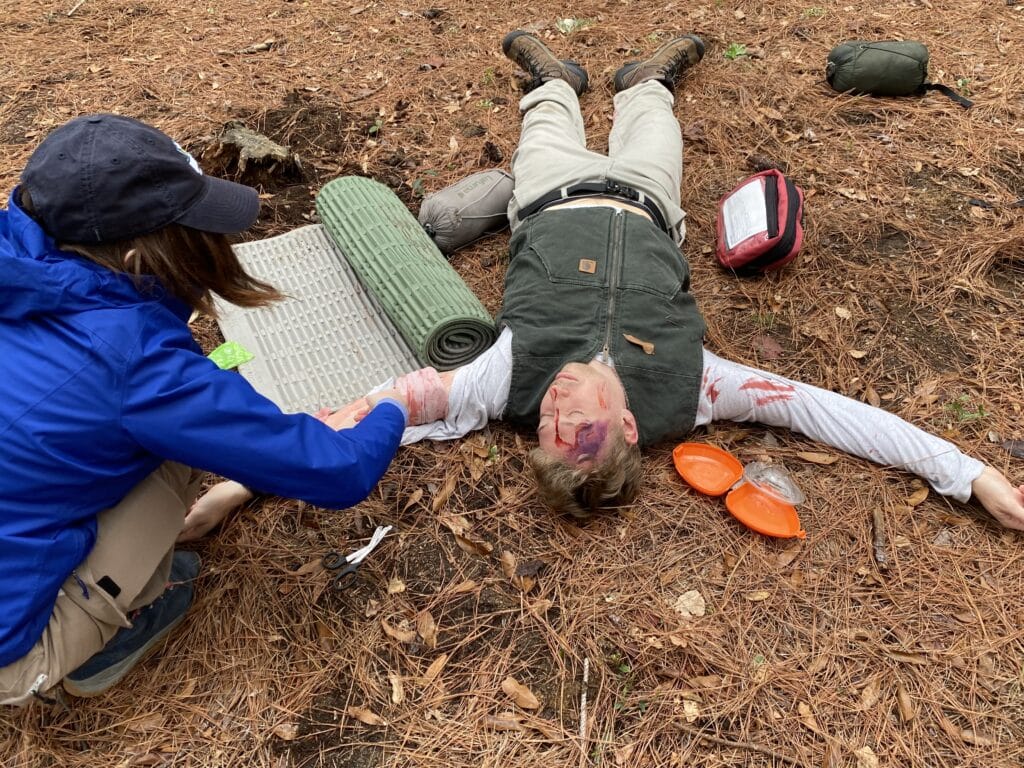
Understanding What a Neurovascular Assessment Entails
A neurovascular assessment is a collection of tests used by medical clinicians, including emergency medical personnel such as Wilderness First Responders and Wilderness EMTs, to determine whether someone is suffering nerve damage or impaired blood flow. Neuro refers to anything related to the body’s nervous system, and vascular refers to anything related to the body’s blood vessels. Neurovascular function encompasses the interplay between the brain, spinal cord, peripheral nerves, and blood vessels that supply oxygen and other vital nutrients to organs, limbs, and tissues. Any disruption of this intricate balance can lead to severe consequences ranging from impaired cognition to more severe conditions such as stroke or the loss of a limb.
Neurovascular status can be determined by simple tests of the following three functions: (more…)
Exploring 2024 Summer Camp Experiences for Teens
Summer CampIt’s that time of year — from mid-winter to early spring — when teens, parents, and others are asking for recommendations about fun, educational, and enriching summer camp experiences and outdoor adventures for late-May, June, July, and August.
With all of the outdoor options available, finding the right summer camp experience can pose a formidable challenge. First off, you need to narrow your choices down to one of three broad categories: day camp, residential camp, or virtual camp.
From there, you need to choose a focus, such as outdoor adventure, academic enrichment, arts and crafts, sports (football and soccer camps, for example), or performance arts (such as ballet or theater). And, at some point, you’re going to need to choose a location, perhaps in the Pacific Northwest, Alaska, or North Carolina.
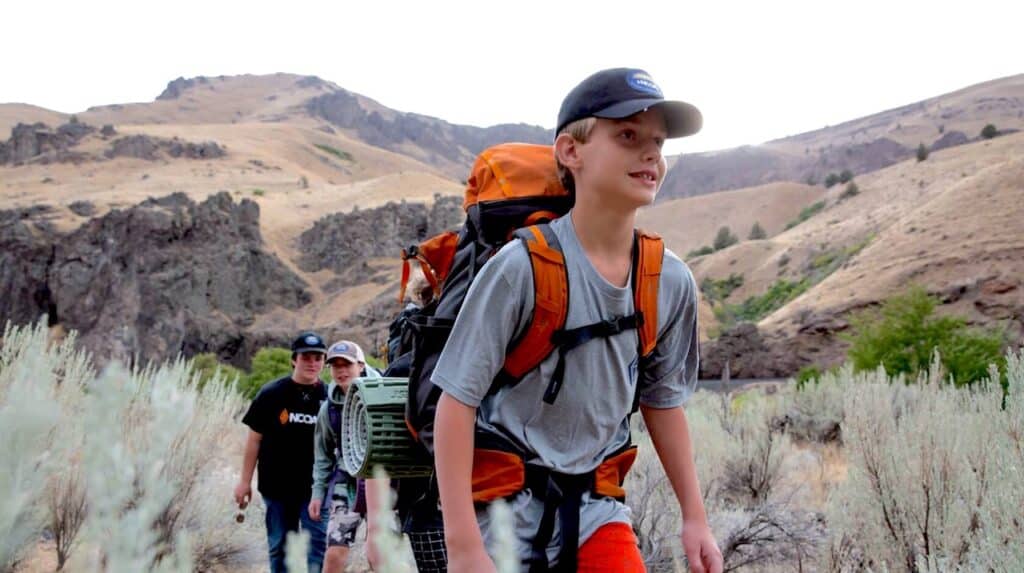
In this post, we tell you about three upcoming opportunities for you to personally meet with experienced summer camp leaders — including our staff at The National Center for Outdoor and Adventure Education (NCOAE). These summer camp specialists will provide you with information about the benefits of leadership-focused summer camp experiences for teens who have an appetite for camping, rock climbing, mountaineering, white water rafting, and other human-powered outdoor adventures.
2024 Teen Summer Camp Expos
If you’re shopping for an outdoor adventure this summer for your teen, consider attending a summer camp fair near you. This year (2024), NCOAE will be exhibiting at three camp fairs — two in North Carolina and one in Georgia:
- Wilmington Parent Magazine’s 21st Annual Summer Camp Fair: This is the only event of its kind in the area, providing families with a unique opportunity to explore the summer camp and enrichment options available to their children during summer break.
Date: Sunday, February 11, 2024
Time: 10 a.m. to 3 p.m.
Location: Elks Lodge, 5201 Oleander Drive, Wilmington, NC
For more info, visit: Wilmington Parent Magazine’s 21st Annual Summer Camp Fair - Triangle Summer Camp Expo
Date: Saturday, March 16, 2024
Time: Noon to 3 p.m.
Location: Wake County Shrine Club, 6015 Lead Mine Road, Raleigh, NC
For more info, visit: Triangle Summer Camp Expo - Atlanta Camp Fair
Date: Sunday, March 17, 2024
Time: Noon to 3 p.m.
Location: Agnes Scott College, 141 East College Avenue, Decatur, GA
For more info, visit: Atlanta Camp Fair
Appreciating the Benefits of Leadership-Based Summer Camp for Teens
Accredited adventure-based experiential and outdoor education companies like NCOAE offer leadership-based summer camps that provide a unique opportunity for teens to develop technical outdoor skills along with personal competencies in the following four areas: (more…)
What Is Wilderness Medicine?
Wilderness MedicineWhen the average person encounters the term “wilderness medicine,” they typically assume it is referring to the practice of medicine in a remote or harsh environment with little to no access to medical equipment or supplies.
They may imagine a scenario of providing CPR to someone who suffered cardiac arrest during a whitewater rafting adventure or creating a splint out of a branch and a few strands of twine to help a hiker with a sprained ankle become ambulatory.
While these notions of wilderness medicine aren’t far off the mark, they are limited. In other words, close but no cigar. It’s all the above and more, which makes it a challenge to come up with a clear and comprehensive definition.
Teaching Wilderness Medicine at NCOAE
Here at The National Center for Outdoor Adventure and Education (NCOAE), our wilderness medicine courses begin with a discussion of what wilderness medicine is, as well as what each student hopes to learn from the course. Often, these discussions elicit points of discussion that require an even broader definition of the term.
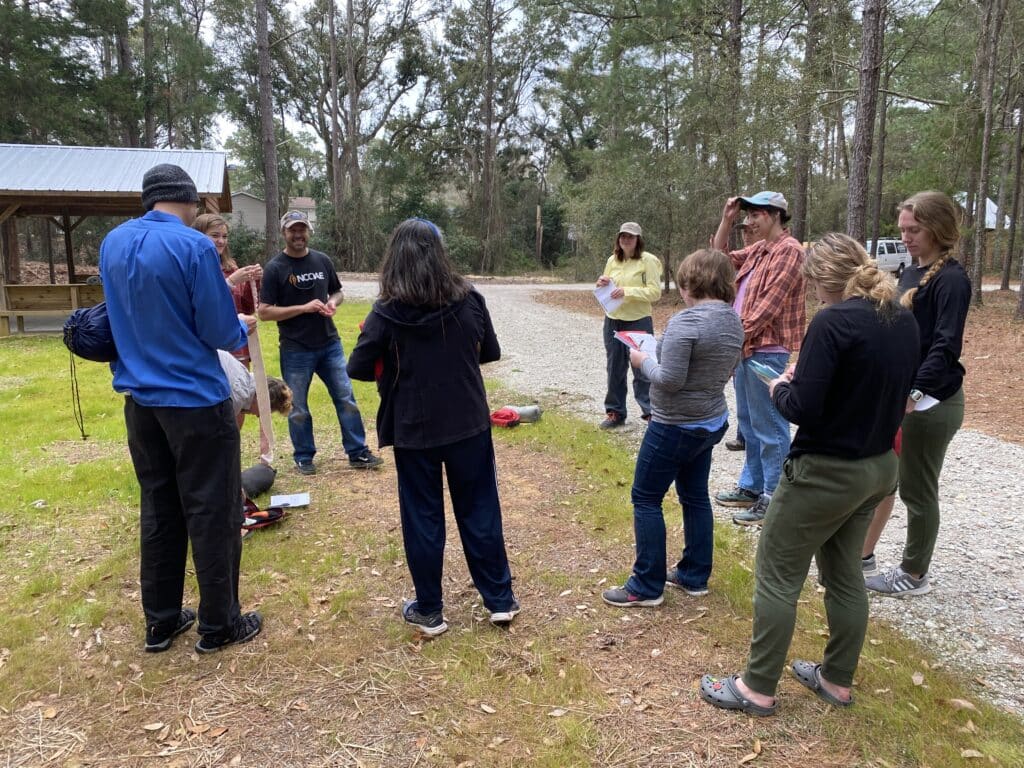
While there’s no universally agreed upon definition of wilderness medicine, certain components set it apart from non-wilderness medicine. For the purpose of this blog post, let’s begin with the following definition:
Wilderness Medicine is provision of medical care when environmental conditions play a stronger role in decision making and interventions than the established systems of care.
Wilderness Medicine encompasses not only the treatment of injuries and illnesses in these settings but also includes preventive measures, survival skills, and the management of environmental hazards such as extreme weather, hazardous terrain, and wildlife encounters.
Wilderness medicine skills and techniques can be applied in a variety of setting, including but not limited to: (more…)
NCOAE’s 2024 Camping and Outdoor Adventure Gear Improvement Guide
Outdoor EquipmentFrom November 1st to the end of the year, you’ll be bombarded with advertising, discounts, and announcements of “shopping holidays.” In the winter months, you’ll find all sorts of sales on camping and backcountry clothing and gear, as retailers clear out their 2023 stock and announce new products for the spring and summer.
And if you’re looking for the perfect gift for yourself or your loved ones who spend lots of time outdoors, you can find plenty of Shopper’s and Buyer’s Guides to consult for ideas.
This is not any of that.
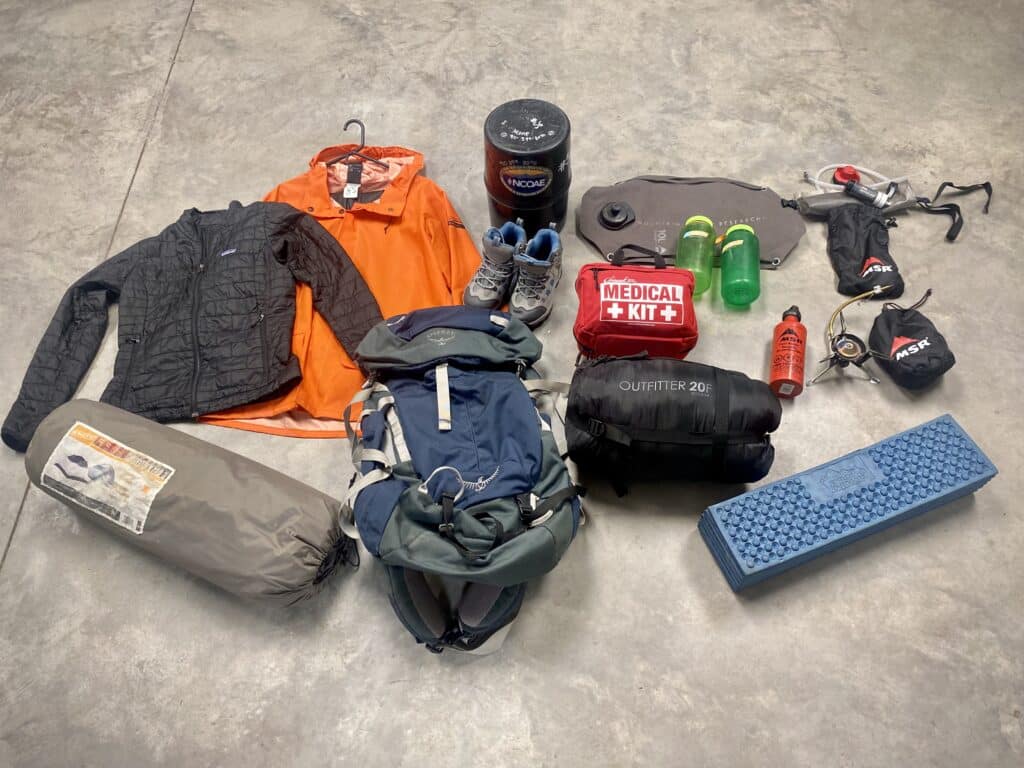
In this post, we do not steer you toward specific camping or outdoor adventure products or brands. In fact, depending on your situation, our advice may inspire you to shed some gear. The ultimate objective is to accumulate gear that makes your human-powered outdoor experiences more awesome than ever without spending so much money that you can’t afford to go anywhere!
Gear Up with a Leave No Trace Mindset
Leaving no trace in the backcountry doesn’t only apply to the seven principles of Leave No Trace (LNT). It begins with how we buy, use, and consume only what we need when engaging with the outdoors. Buying the latest, greatest outdoor clothing and gear each year runs counter to that philosophy. In addition, if you’re on a limited budget, it reduces the funds you have available to take (more…)
Spinal Immobilization or Spinal Motion Restriction: Which is Safest?
Emergency MedicineFor decades, spinal immobilization (SI) has been the standard practice when moving trauma patients with potential spinal injuries. Indeed, this particular procedure has long been commonplace for patients injured in the backcountry. Spinal immobilization involves the use of various devices, including a long spine board (LSB) and a cervical collar to stabilize the spine and prevent further injury.
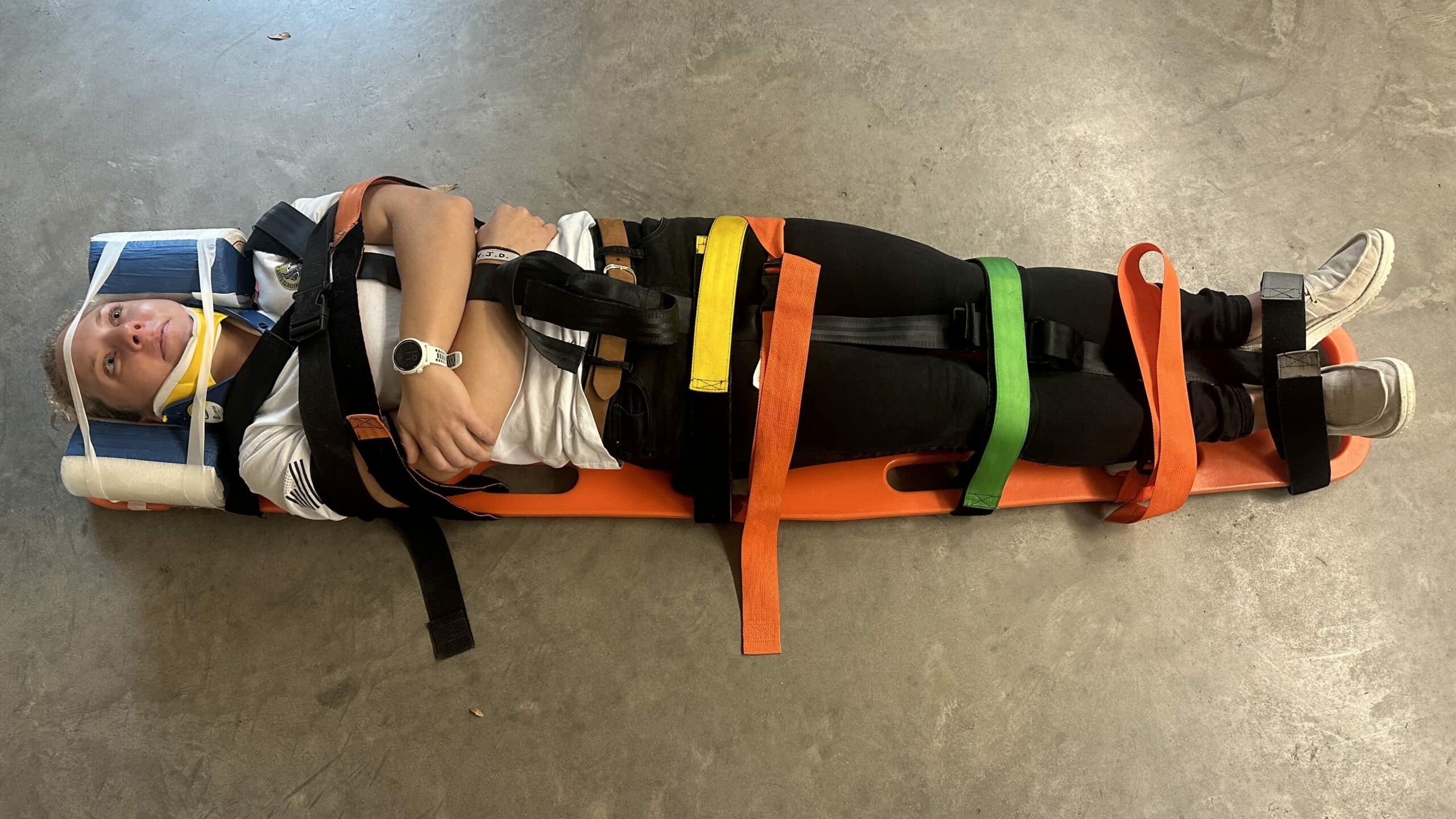
However, recent research has called this practice into question. In fact, while current techniques limit or reduce undesired motion of the spine, they do not succeed in fully immobilizing the spine. For this reason, the term “spinal motion restriction (SMR)” has gained favor over “spinal immobilization.”
Both terms refer to the same concept — minimizing unwanted movement of the potentially injured spine. However, while LSBs have historically been used to attempt spinal immobilization, SMR may be achieved using a scoop stretcher, vacuum splint, ambulance cot, or other similar device to which a patient is safely secured.
The National Registry of Emergency Medical Technicians (NREMT) defines the term “spinal immobilization” as the use of adjuncts (LSB, cervical collar, etc.) to prevent movement of the spine. The term “spinal motion restriction” is defined more broadly as attempting to maintain the spine in anatomic alignment and minimizing gross movement — irrespective of adjuncts.
Evaluating the Efficacy of Spinal Immobilization
The effectiveness of the LSB to prevent further trauma to the spine has never been proven in high-level trials. Its use was adopted largely by consensus and not driven by data from any formal studies. An extensive literature review on the history of not using the LSB as a tool concluded that it is ineffective and may be detrimental by delaying time-sensitive treatments for some patients.
A study published by Cambridge University Press examined patient outcomes over a decade during which Emergency Medical Service (EMS) systems decreased backboard use as they transitioned from SI to SMR protocols. The study included (more…)
Leadership Skills & Personal Development are Backcountry Bonuses at NCOAE
Outdoor EducationEditor’s Note: Today’s post is the 250th since we launched our blog in December of 2013. And what better way to mark the occasion than by publishing a post about the efficacy of outdoor and adventure-based experiential education. Thank you to everyone who has been along for the ride so far. From our writers and editors to our readers and those who choose to share our posts, we appreciate the opportunity to share our expertise and experience and we look forward to continuing to do so for many years to come.
Leadership Skills, Personal Development are Backcountry Bonuses at NCOAE
By, Elizabeth Shirley, WFR, NCOAE Director of Outdoor Programming & Education
For those of us who work in adventure-based and experiential outdoor education, it’s pretty much a given that backcountry, expedition-style experiences can set students up for success in life, sometimes well beyond the expedition itself. Whether these wilderness experiences include the mountains of Alaska, the rivers of the Pacific Northwest, or the coast of North Carolina, outdoor education expeditions offer an opportunity for meaningful life experiences.
In fact, backcountry courses planned and expertly guided by The National Center for Outdoor & Adventure Education (NCOAE) are intentionally designed expeditions, with a focus on leadership and personal development that goes hand in hand with learning or improving technical outdoor skills and environmental science.
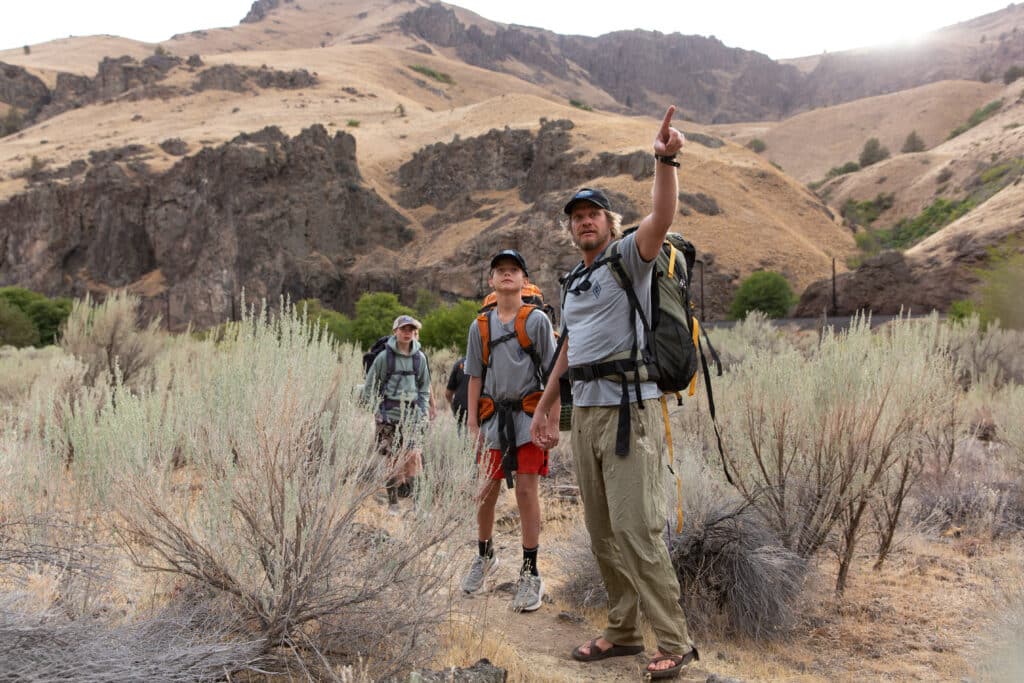
The term “empower” has become a trite and ineffective word in today’s world, much like a father telling his son, “I empower you to mow the lawn.” However, there are numerous occasions during an NCOAE wilderness expedition where students are offered a variety of opportunities to step into leadership roles while in the field.
These assignments include serving as a Leader of the Day — a student charged with making sure the group stays on task and on the trail, utilizing a map and compass. The Cook of the Day guides the assigned expedition members in the preparation of meals and the subsequent cleanup. And the Gear Crew helps the group set up camp, position bear hangs, collect water, and more. Students also participate in a variety of (more…)
Meet the NCOAE Student: Tina Haver Currin, WEMT
Student ProfilesTina Currin’s dance card remains full after completing our 27-day Hybrid Wilderness EMT course this past March. For starters, Tina is currently wrapping up the Triple Crown of American long-distance hiking. In fact, she’s about 1,600 miles into the Continental Divide Trail, which runs the length of the Rockies — from Canada to Mexico.
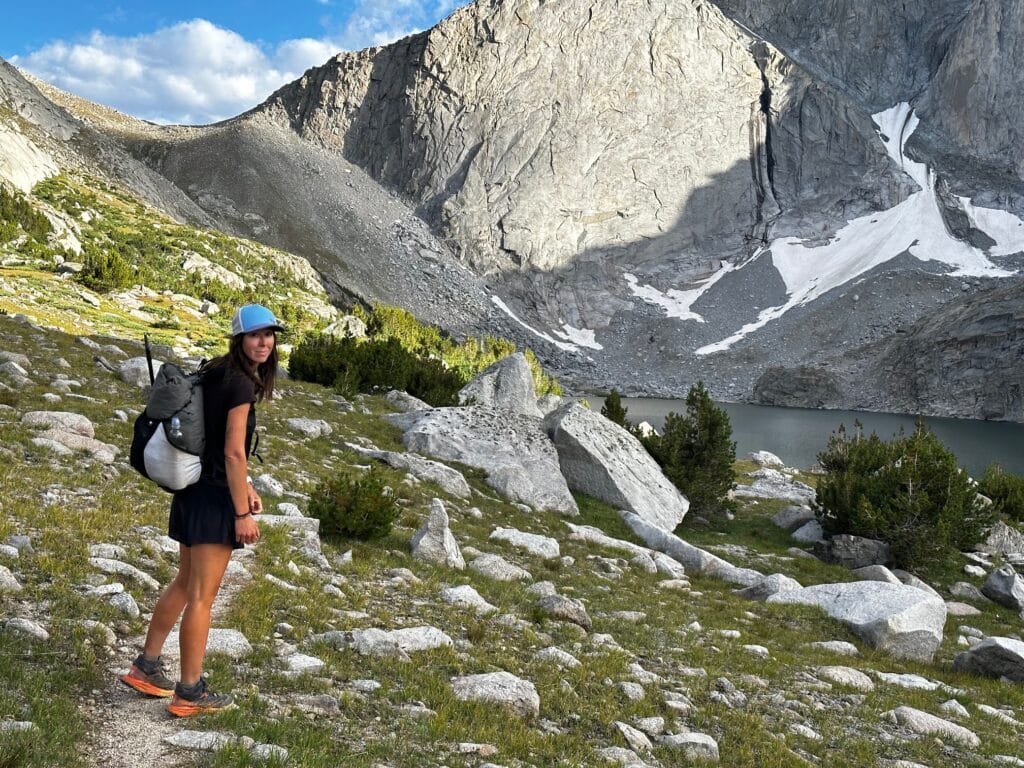
“I should be done in about a month, by which point I’ll have hiked more than 10,000 miles on National Scenic Trails across the USA,” she recently told us. We should note that traversing the Divide isn’t the first of her long-distance backpacking rodeos. Tina’s also tackled the Appalachian & Pacific Crest Trails, as well as major trail systems in Arizona, Florida and throughout New England.
Depending on the season, Tina is a freelance writer, National Park Service (NPS) Ranger, and a long-distance backpacker. She’s worked as a ski liftie, spent a summer season guiding cave tours, and organized large-scale charity events and bike races.
Professionally, Tina has created content for the NPS’ social media accounts and currently contributes articles to NPS.gov. She also writes blog posts and conducts product testing for Hyperlite Mountain Gear and Nashville Pack and Equipment Company. And she occasionally contributes what she terms “grainy photographs” to Outside Magazine.
Why Tina Chose NCOAE’s W-EMT Course
So, with a schedule that makes her feel “like a strange assemblage of a zillion somewhat-related skills stuffed inside a hiker’s body,” why did this backcountry wonder carve out a full month of time for NCOAE’s intensive W-EMT training program?
Tina said the reason she signed up for the (more…)
NCOAE Garners Prestigious ‘Organizational Member of the Year’ Award from AEE
AEEIn the world of outdoor education and adventure-based recreation, there are shining stars that not only inspire peers with their reputation but also for setting the bar high for industry best practices. And here at NCOAE, we operate as if we’re one of those shining stars — not at the exclusion of anyone else, but to push ourselves to be the best we can be.
As a result of our, The National Center for Outdoor & Adventure Education (NCOAE) has been named the 2023 Organizational Member of the Year by the Association for Experiential Education (AEE).
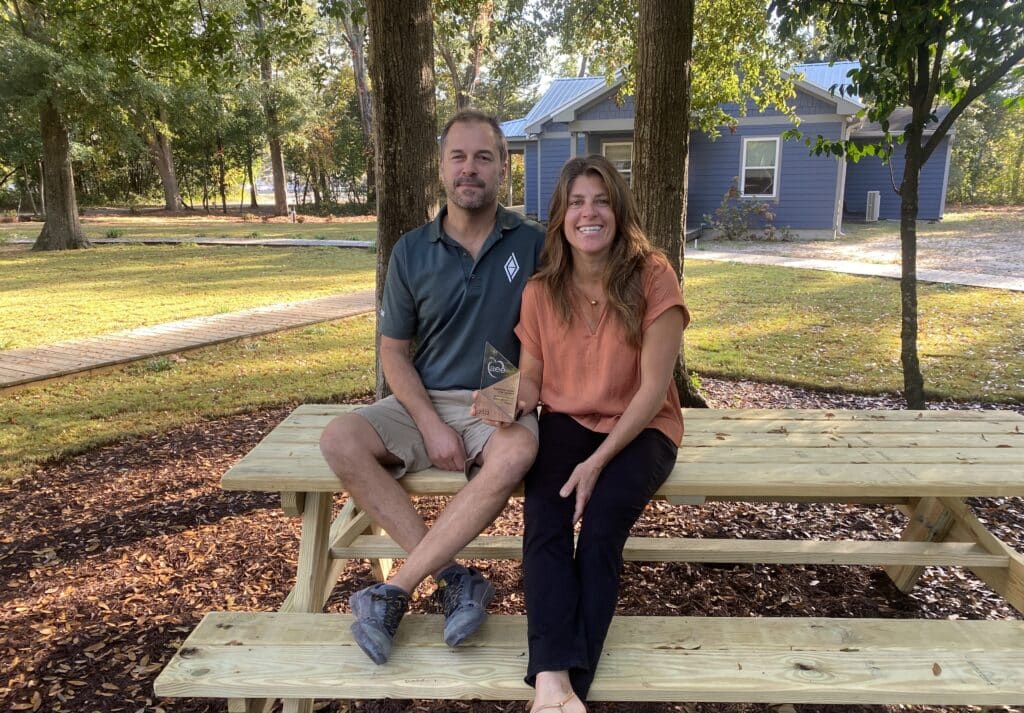
This prestigious honor comes as a result of developing and maintaining innovative programming at continuously high levels, including high ethical standards in our operations and programming, and being a supportive association member.
AEE the Organization
If you’re unfamiliar with AEE, it’s a well-respected and influential organization in our sector of the outdoor industry, that has been honoring organizations for their contributions for nearly a half century. NCOAE now joins the ranks of renowned organizations such as Deer Hill Expeditions, Thompson Island Outward Bound, Prescott College, and Project Adventure — all previously recipients of this accolade.
The St. Petersburg, Florida-based association, which was previously headquartered in Boulder, Colorado, is a (more…)
SOAP Notes Keep Wilderness Medicine Clean
Wilderness MedicineIn the context of wilderness medicine, soap and SOAP are both indispensable. An explanation is in order. We’re all familiar with lower-case soap. This noun refers to a substance that’s added to water to remove dirt, grease, grime, and germs from various surfaces, including skin, hair, clothing, pots and pans, and so on.
Soap In The Wilderness
Traditional soap works in two ways — as a surfactant to break water tension, improving water’s ability to penetrate surfaces, and as a molecule that has a love-hate relationship with water. Soap molecules have two ends, one that’s hydrophilic (loves water) and the other that’s hydrophobic (hates water). The hydrophilic end binds to water, while the hydrophobic end binds to anything other than water — dirt, grease, grime, germs. Imagine soap molecules as tiny carabiners that shackle dirt molecules to water molecules to enable the water molecules to usher them away.
In backcountry and wilderness settings, soap plays a vital role in preventing infection and transmission of disease. In fact, scrubbing vigorously with soap and water may be among the most important risk-management technique you practice during your time in the wilderness.
SOAP (Subjective, Objective, Assessment, Plan)
Now let’s move on to the other SOAP — all uppercase — which is an acronym for Subjective, Objective, Assessment, and Plan. As an outdoor educator, field instructor, or wilderness guide, this note-taking procedure is nearly as important as scrubbing your hands regularly with soap and water. This is especially true when you’re dealing with a client injury or illness in a remote setting.
SOAP Notes, which I’ll be covering in this post, separate important information from the chaos and fog of emotion in order to provide clean, uncluttered details for making informed medical decisions and emergency response plans.
With SOAP Notes in hand, field instructors and outdoor educators trained in wilderness medicine, as well as backcountry guides, are better prepared to respond to a medical emergency. They do this by:
- Following an organized, methodical process
- Tracking changes in a patient’s health status
- Keeping a record of assessments, anticipated problems, and any interventions already provided
- Communicating with emergency responders
- Ensuring a seamless transfer of patient care to next-level healthcare providers
- Documenting cases and care for improving organizational outcomes
Here at The National Center of Outdoor Adventure and Education (NCOAE), we developed the SOAP Note form shown below.

Our SOAP Note’s Form
Our SOAP Note form consists of the following seven sections (more…)
The Value of NCOAE’s Curriculum Focusing on Leadership and Personal Growth
Outdoor EducationWhat happens when someone answers the call to outdoor adventure and enrolls in a wilderness education, outdoor education, or backcountry expedition like the ones we offer at The National Center for Outdoor & Adventure Education (NCOAE)?
They’re pretty much guaranteed they’ll be engaged in an experience that involves adventure, challenges, and fun, but most important — learning. I mean, just do the math: “Adventure” and “Education” is at the tail end of our name.
Our Educational Framework (see below) is the basis for what we do within the practice of outdoor education, just as the Experiential Learning Cycle itself defines how we do it, and our Theory of Change explains why we do it.
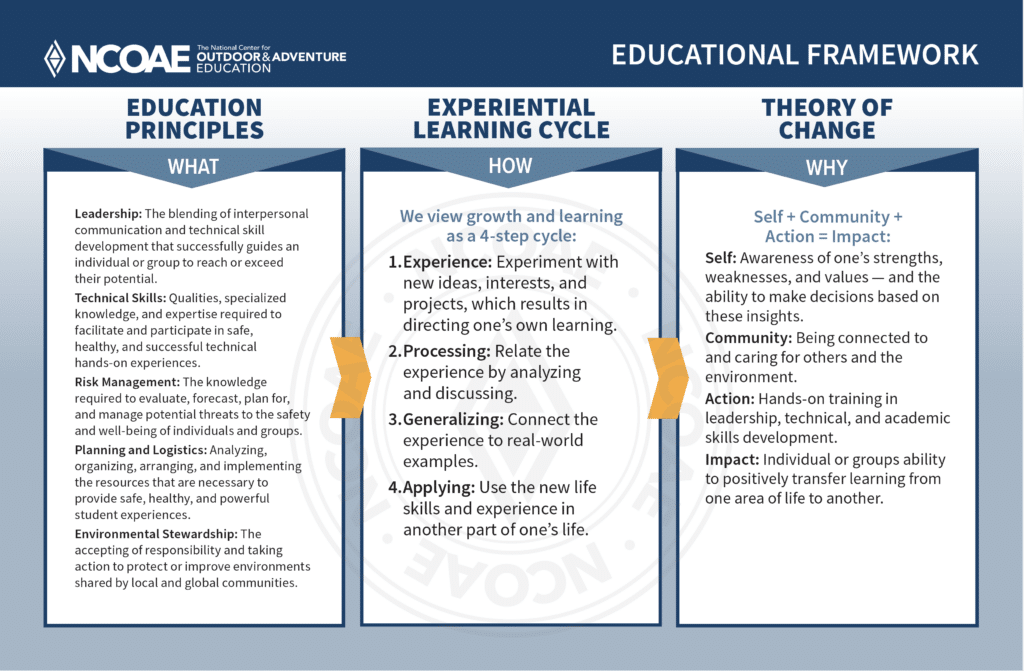
At NCOAE, we are undeniably invested in teaching technical outdoor skills, the science of applying risk management to wilderness and backcountry expeditions, and planning and logistics — the cornerstones of living safely and in relative comfort during an adventure-based expedition. Our course areas are spread across the globe and provide a unique context to engage in lessons on environmental stewardship and Leave No Trace’s principles of outdoor ethics. However, one of the top areas upon which we focus during an NCOAE expedition is leadership.
Our students are guided to process, generalize, and apply what they are experiencing during an NCOAE program, with the ultimate objective of (more…)
Maintaining Resilience and Mental Health in the EMS Profession
Emergency MedicineThe suicide rate among emergency medical service (EMS) professionals rose a shocking 38 percent since 2009, according to a study published in the Western Journal of Emergency Medicine. But as shocking as that statistic is, it should come as no surprise.
As an emergency medical technician (EMT) or paramedic, you typically work a five-day rotation of 12-hour shifts (days or nights). You may start the week working Monday and Tuesday and then have Wednesday and Thursday off. You spend half your first day off catching up on sleep, doing chores, and running errands. You’re free the next day, but pretty much alone because everyone you know is at work or school or busy with other normal weekday obligations.
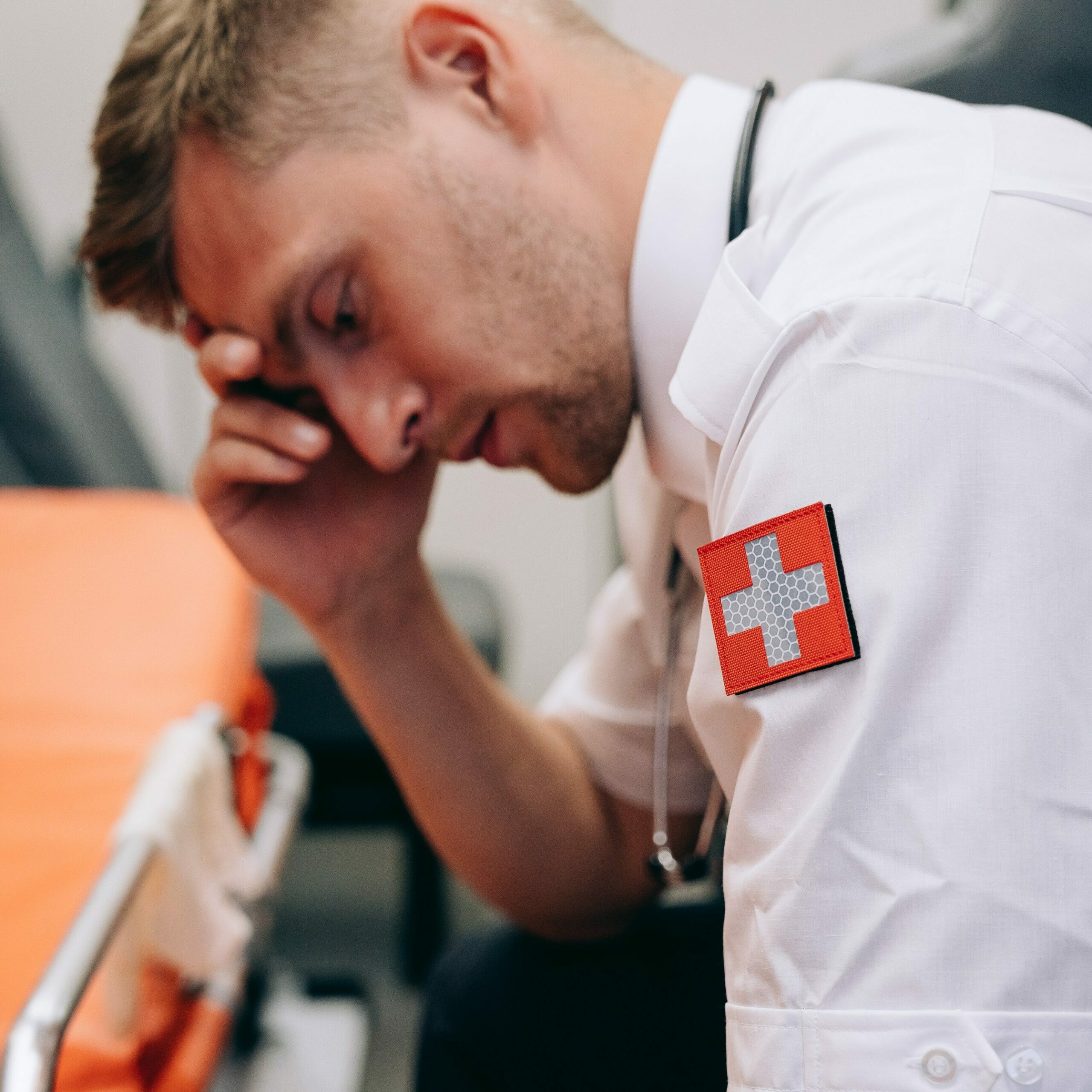
As a result, you likely lack the social connections many of us rely on for emotional support and psychological well-being. Come Friday, Saturday, and Sunday — when your friends and family are off work — you’re back on the job, providing critical medical care in highly stressful situations involving people who don’t always treat you with the respect and appreciation you deserve. And you have to perform this service with a smile on your face, because you don’t want a complaint on your record.
To make matters worse, emergency medical care leaves no room for mistakes. Quality assurance (QA) and quality improvement (QI) programs ensure that Monday morning quarterbacks are always looking over your shoulder to spot mistakes and offer their criticism and sage advice from their comfortable seats along the sidelines.
It’s Getting Worse Instead of Better
Thanks to high healthcare costs and doctor shortages, many people don’t have access to (more…)
2023 Outdoor Industry Conferences for Outdoor Educators
ConferencesAs we do each year, we are once again taking advantage of this space to inform you about opportunities for you, your staff, and your organization to participate in professional development, networking, and business growth and development available at upcoming outdoor industry conferences.
In this edition, we are spotlighting nine events taking place between now and the end of this year, as well as bringing to your attention six more events scheduled for the first part of 2024 that might be worthwhile marking on your calendar.
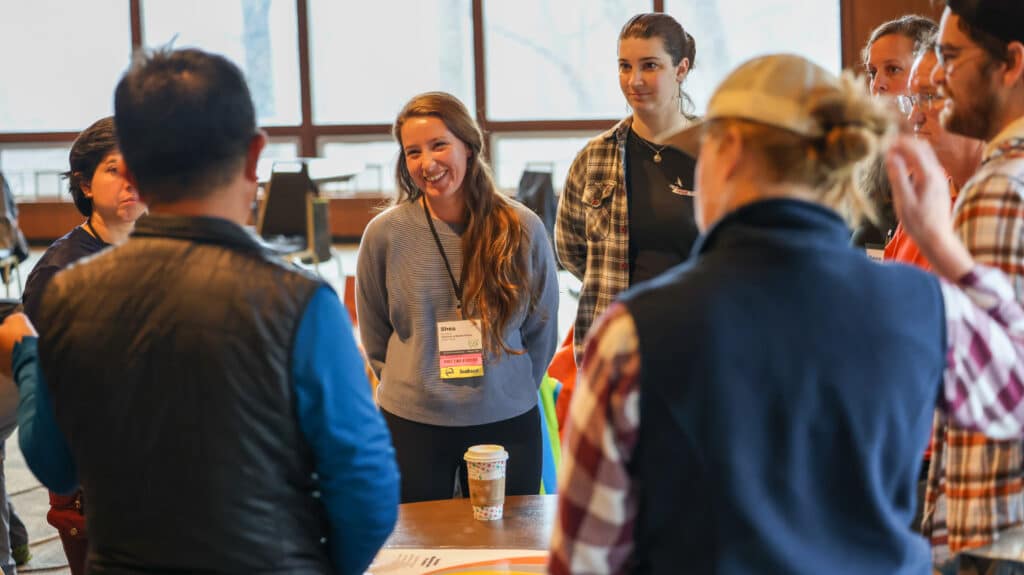
5TH ANNUAL OUTDOOR ECONOMY CONFERENCE
Sept. 18-21, 2023 | Cherokee, North Carolina
Website: https://outdooreconomy.org
Why you should attend: This in-person, multi-day event is designed to foster intentional connections among stakeholders across the outdoor economy, igniting collaborations and catalyzing meaningful actions.
Why your company or organization should exhibit: Whether you’re a conference sponsor with booth space included in your sponsorship package or an independent exhibitor, conference organizers have curated a dynamic program that allows you and your staff to engage with the attendees while respecting the event’s other scheduled activities.
2023 OUTDOOR MEDIA SUMMIT
Sept. 24-26, 2023 | Boise, Idaho
Website: https://outdoormediasummit.com
Why you should attend: Outdoor Media Summit is where some of the brightest minds in outdoor media and marketing gather to share their tips, tricks, strategies, and warnings. If you are a marketer at an outdoor industry brand or an editor, freelancer, podcaster, or other content creator, this may be the conference for you.
WILDERNESS RISK MANAGEMENT CONFERENCE
Oct, 18-20, 2023 | Portland, Oregon
Website: https://www.nols.edu/wrmc
Why you should attend: Attend the Wilderness Risk Management Conference in order to gain practical risk management skills, network with others in the outdoor education and adventure programming industry, share field and administrative techniques, and help develop risk management standards for the outdoor adventure and education industries.
Why your company or organization should exhibit: Connect with more than (more…)
Meet the Staff: Kate Javes, NCOAE EMT Instructor, Clinical Coordinator and AHA Training Site Coordinator
Meet the TeamKate Javes has been a huge part of NCOAE’s continued success for a number of years, most recently as our EMS program director. Recently, Kate has decided to step back from that leadership role following three years of developing our Hybrid EMT training program.
In addition, Kate oversaw all of our EMT and AEMT courses as well as instructed students, helped author the first editions of the NCOAE Wilderness Medicine Field Guide and the NCOAE EMT Program Manual, and played a pivotal part in helping our organization navigate the health pandemic caused by the virus named “SARS-CoV-2” and the disease it causes, named coronavirus disease 2019 (COVID-19).
A 2003 graduate of the U.S. Naval Academy who also attended Rutgers (The State University of New Jersey) where she played Division I soccer, Kate is now taking on the duties of an NCOAE EMT instructor, teaching hybrid and in-person 21-day EMT courses, both in North Carolina and in Oregon. In addition, Kate is our clinical coordinator, working with local hospitals and EMS agencies to schedule required clinical hours for the courses in both states.
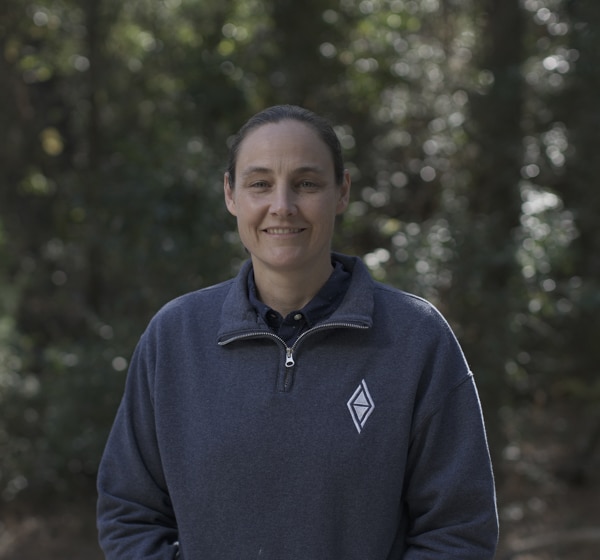
And she’s also our American Heart Association (AHA) training site coordinator. As such, she is the point of contact for the Southern Regional American Heart Education Center regarding all of our AHA courses, responsible for maintaining and submitting documentation for these courses. This is primarily for our BLS (basic life support) for Healthcare Providers courses taught as part of our EMT curriculum. It also includes HeartSaver CPR and First Aid courses as well as instructor certification and recertification.
Before joining NCOAE in 2013, this Maryland native was a paramedic for the New Hanover (NC) Regional EMS for eight years. Prior to that, she was a paramedic and firefighter for a summer for the Antarctic Fire Department. And while serving in the U.S. Marine Corps, Kate was a (more…)
Why Clinical Experience Matters in EMT Training
Emergency MedicineIn the world of emergency medical services (EMS), future EMTs and paramedics accept the reality that their immediate future includes hundreds of hours of lectures, extensive bookwork, and plenty of written tests.
Each of these students has an objective in mind for taking EMT training courses, and their reasons are many. Some are looking to start careers in the EMS profession. Others plan to use their EMT certification as a stepping stone to medical school or physician assistant (PA) school. And there are those who are uncertain about what direction their future might take, so they’re exploring their options.
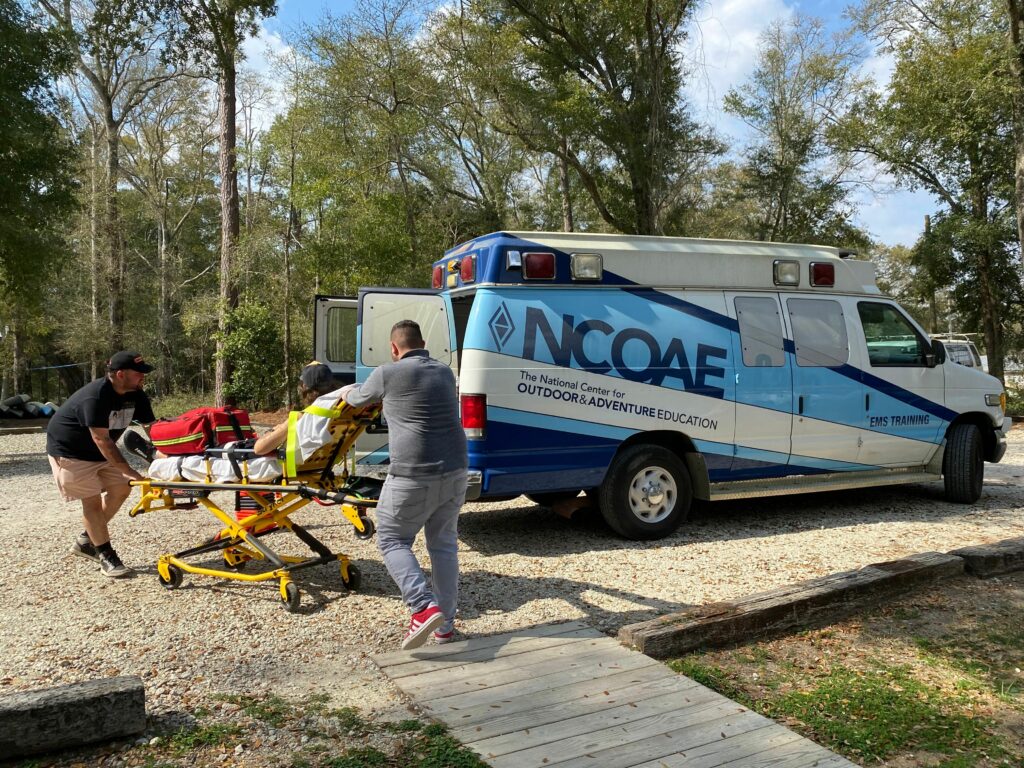
Regardless of the reason why, there are a number of things that simply can’t be “taught” in the classroom. Equally important as “book learning,” and perhaps more vital, is clinical and field experience. What is clinical experience? In the real world, clinical settings feature healthcare providers conducting actual exams and procedures on real patients. Physical examples might be a bustling hospital emergency department, a crowded local health clinic, or finding yourself hovering directly over an (more…)
Frazzled by Eco-anxiety? Find Respite in the Backcountry
Outdoor EducationAs you’ve probably heard or read, last month was the hottest June our planet has ever experienced — topping a prior record set in 2019. In fact, according to the European Union’s Copernicus Climate Change Service, the nine hottest Junes ever occurred over the past nine years.
In addition, extreme heat creates crispy conditions, and last month’s torrid temps were all the kindling needed to promote the one of the worst wildfire season in Canadian and North American history. Add to that a record-breaking cyclone in southeast Africa, heatwaves across Asia, and extreme flooding throughout the world. Oh, and this just in: June sea ice levels in Antarctic were at their lowest level since scientists began keeping records.
All of this highlights what many of us have sensed and now know for certain: Climate change is upon us — and that’s a scary situation for those of us who work in the outdoor industry. The cumulative effect of all of these climate catastrophes has created what the American Psychology Association (APA) calls “eco-anxiety.”
According to the American Psychology Association, eco-anxiety is “the chronic fear of environmental cataclysm that comes from observing the seemingly irrevocable impact of climate change, and the associated concern for one’s future and that of next generations.”
Media coverage adds to the angst
This fear is evident across our land, with hand-painted yard signs and a variety of bumper stickers on vehicles, all advocating that “Science is Real.” Newspaper editorials push for “immediate action,” or ask, “Are We Too Late?” Such articles often crowd out other headlines and newscast bulletins, which only increases our angst.
These conversations about our planet’s future — most of them based on science — have had an effect on most everyone’s emotional state. Words have weight, words plant ideas. And ideas spread faster than anything else, for good or bad.
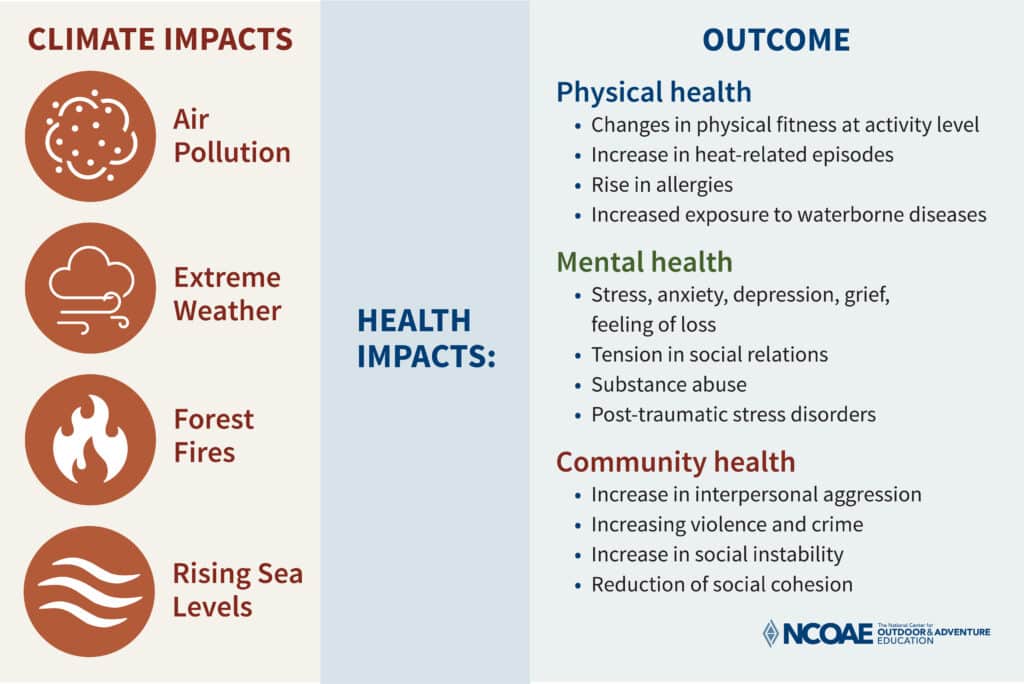
Some people pay attention, some don’t notice, and some dismiss the science out of hand, pushing the notion aside without realizing they are being affected at a cellular level by the emotions that are under the surface. This is what is happening, and sometimes we see it, sometimes we miss it, but in the end we’re all going to feel it personally, or collectively. (more…)
Why Learn Map and Compass Skills in the Age of GPS and Digital Tools?
Outdoor EducationUndoubtedly, you’re either reading this on a smartphone or you’ve got a smartphone in your pocket or sitting on the table or desk in front of you. Most likely, that device features a compass. In fact, the digital app version of one of the most ancient navigational tools in the world comes standard with most cell phones and other mobile devices these days.
Toss in Google Maps, Pacer, Apple Maps, MapMyWalk, Waze, and other directional apps that rely on GPS technology and you’ve got to ask yourself, “Why the heck should I bother using unwieldy paper maps and a handheld compass to explore the backcountry?”
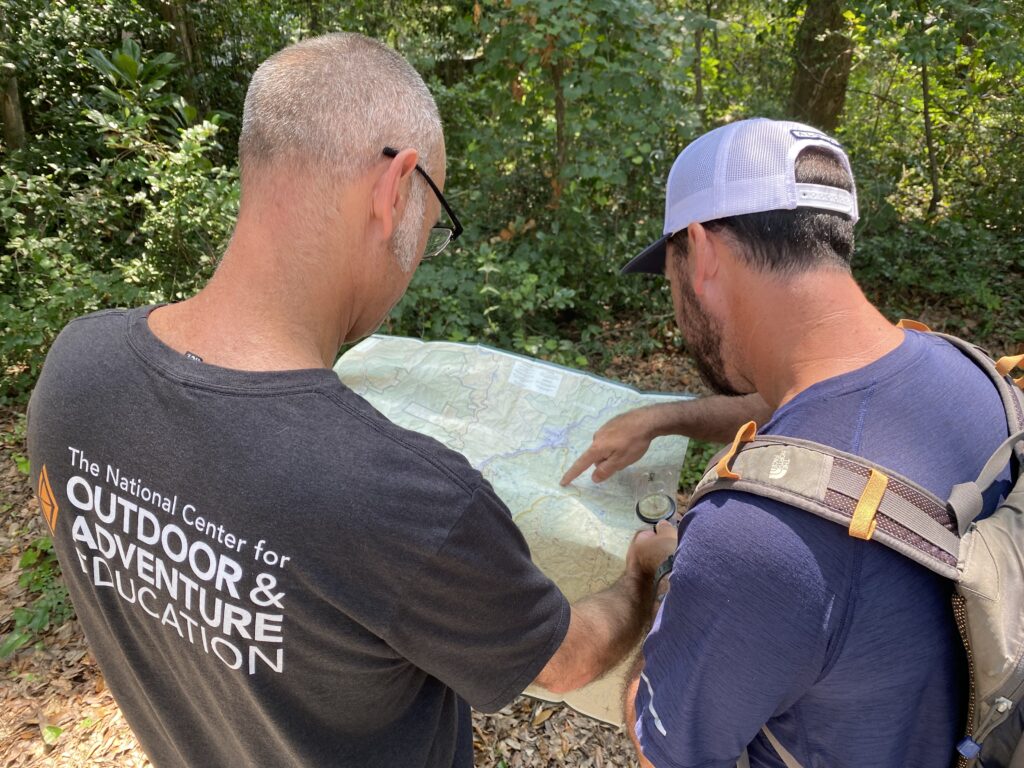
Of course, there are plenty of good reasons to master traditional map and compass skills, the most obvious being, “Damn, I got no signal.”
Here at The National Center for Outdoor and Adventure Education (NCOAE), we include lessons in basic map and compass skills on every expedition we lead. In fact, it’s part of our “First 48” programming, which teaches students important technical skills they’ll need to know within the first two days of any NCOAE backcountry expedition.
During the Fist 48, NCOAE course participants learn the basics of a baseplate compass, as well as how to (more…)
TALK TO US
Have any further questions about our courses, what you’ll learn, or what else to expect? Contact us, we’re here to help!